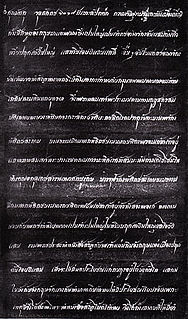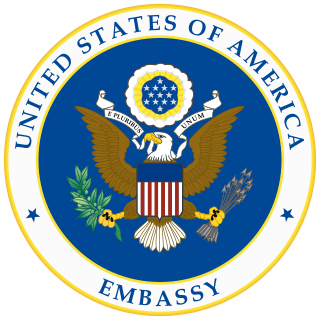Related Research Articles

The economy of Thailand is dependent on exports, which accounted in 2019 for about sixty per cent of the country's gross domestic product (GDP). Thailand itself is a newly industrialized country, with a GDP of 16.316 trillion baht (US$505 billion) in 2018, the 8th largest economy of Asia, according to the World Bank. As of 2018, Thailand has an average inflation of 1.06% and an account surplus of 7.5% of the country's GDP. The Thai economy was expected to post 3.8% growth in 2019. Its currency, the Thai Baht, ranked as the tenth most frequently used world payment currency in 2017.
The foreign relations of Thailand are handled by the Ministry of Foreign Affairs of Thailand.

Nangklao, birth name Thap, also styled Rama III, was the third king of Siam under the House of Chakri, ruling from 21 July 1824 to 2 April 1851.
In international law, extraterritoriality is the state of being exempted from the jurisdiction of local law, usually as the result of diplomatic negotiations.

This article covers the history of the Philippines from the recognition of independence in 1946 to the end of the presidency of Diosdado Macapagal that covered much of the Third Republic of the Philippines, which ended on January 17, 1973 with the ratification of the 1973 Constitution of the Republic of the Philippines.
The Foreign Business Act was a law enacted by the Chuan Leekpai-controlled National Legislative Assembly of Thailand in 1999 that limited foreign ownership of certain Thai industries. Its predecessor was the Alien Business Act of 1972, enacted by a military junta. Industries which must be majority-owned by Thais included the newspaper business, radio stations, television stations, rice farming, animal husbandry, fishing, land trading, mining, wholesaling and retailing, restaurants, and all service businesses. The law criminalized nominees, any Thai who held shares on behalf of a foreigner. Nominees could be fined 100,000 to 1 million baht and face up to 3 years in prison. However, the law did not prohibit foreigners from being the majority in the board of directors and also did not prohibit having different classes of shares with differing voting rights. This loophole allowed thousands of foreign-controlled businesses to operate in Thailand.

The Bowring Treaty was a treaty signed between the British Empire and the Kingdom of Siam on 18 April 1855. The treaty had the primary effect of liberalizing foreign trade in Siam, and was signed by five Siamese plenipotentiaries and Sir John Bowring, the British envoy and colonial governor of Hong Kong.

Bilateral relations between the Kingdom of Thailand and the United States of America date back to 1818. Thailand and the United States have long been close allies and diplomatic partners.
Treaty of Bangkok or Bangkok Treaty may refer to:

Mexico–United Kingdom relations refers to the bilateral relations between Mexico and the United Kingdom. Both nations are members of the G-20 major economies, Organisation for Economic Co-operation and Development and the United Nations.

Visitors to Thailand must obtain a visa from one of the Thai diplomatic missions unless they come from a visa-exempt country or a country whose citizens are eligible to obtain visas on arrival.

Saudi Arabia–Thailand relations ; refers to the current and historical relations between Saudi Arabia and Thailand. Saudi Arabia has an embassy in Bangkok and Thailand has an embassy in Riyadh but representation is at the chargé d'affaires rather than ambassadorial level. However Saudi Arabia and Thailand aim to restore the relations between their two nations. Relations between the two countries were established in 1957 and hundreds of thousands of Thais went to Saudi Arabia to work. The historically friendly and strategic partnership between Saudi Arabia and Thailand has deteriorated significantly following the Blue Diamond Affair. Although regardless of relation status, Saudi Arabia and Thailand have high trade between two nations. In recent Saudi Arabia and Thailand have shown intent to repair the relations between the two kingdoms.
The Treaty of Amity and Commerce between His Majesty the Magnificent King of Siam and the United States of America, or Roberts Treaty of 1833, was the first treaty between the United States and an Asian nation.

The Embassy of the United States in Bangkok is the diplomatic mission representing the United States in Thailand.

The Arab League boycott of Israel is a strategy adopted by the Arab League and its member states to boycott economic and other relations between Arabs and the Arab states and Israel and specifically stopping all trade with Israel which adds to that country's economic and military strength. A secondary boycott was later imposed, to boycott non-Israeli companies that do business with Israel, and later a tertiary boycott involved the blacklisting of firms that do business with other companies that do business with Israel.
The Treaty of Amity, Economic Relations and Consular Rights between the United States and Iran was signed in Tehran on August 15, 1955, received the consent of the U.S. Senate on July 11, 1956 and entered into force on 16 June 1957. The treaty is registered by the United States to the United Nations on 20 December 1957. The official texts are in English and Persian. It is sealed by plenipotentiaries Selden Chapin (U.S.) and Mostafa Samiy (Iran). The Treaty has served as the jurisdictional basis for various international legal disputes between the United States and Iran, including the International Court of Justice (ICJ) cases Oil Platforms and Alleged Violations of the 1955 Treaty of Amity, Economic Relations and Consular Rights. In October 2018, the United States provided notice that it would be withdrawing from the Treaty following Iran's use of the Treaty as a basis to challenge the U.S. imposition of sanctions under the Joint Comprehensive Plan of Action (JCPOA) in the Alleged Violations case.

Alleged Violations of the 1955 Treaty of Amity, Economic Relations, and Consular Rights is the formal name of a case in the International Court of Justice (ICJ). Iran filed a lawsuit with the Hague-based ICJ against the United States, on 16 July 2018, mainly based on the 1955 Treaty of Amity signed between the two sides on 15 August 1955 and entered into force in 1957, well before the Islamic revolution of Iran. Iranian officials alleged that U.S. re-imposition of the nuclear sanctions was a violation of the treaty. Iran also filed a request for provisional measures. In response, the United States asserted that the lawsuit as "baseless" and vowed to oppose it. Almost a month later, the ICJ heard the provisional measures request. On 3 October 2018, the International Court of Justice issued a provisional measures order requiring the United States "to lift sanctions linked to humanitarian goods and civil aviation imposed against Iran."

Michael George DeSombre is the former United States Ambassador to the Kingdom of Thailand. Prior to his Senate confirmation in January 2020, he was a partner of Sullivan & Cromwell. He is also a former chairman of Save the Children Hong Kong.

Thailand–Turkey relations are the modern foreign relations between Thailand and Turkey. The cordial relations between the two countries date back to 1958, when the two countries established diplomatic relations. Shortly after, Turkey set up its embassy in Bangkok. Thailand reciprocated by opening its embassy in 1972. However, even during the era of the Ottoman Empire, there had been historical contacts between the Empire and Siam at the time -- most notably the visit of Prince Damrong, younger brother of King Chulalongkorn the Great of Siam, to Istanbul as the royal guest of Sultan Abdul Hamid II in 1891.
References
- ↑ "TREATY OF AMITY AND ECONOMIC RELATIONS BETWEEN THE KINGDOM OF THAILAND AND THE UNITED STATES OF AMERICA". Thailand Law Forum. Retrieved 16 November 2015.
- ↑ "Business; Frequently Asked Questions (FAQs)". Embassy of the United States, Bangkok. Retrieved 16 November 2015.